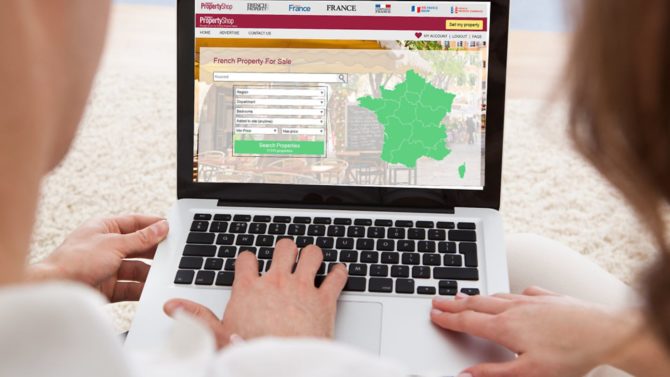How to find your perfect French property from your sofa


When you’re tight for time and money and unable to keep popping over to France to view properties, you need to eliminate the duds from your shortlist before you get to France so you only visit the serious contenders – here’s how

1. Make use of your French estate agents
DIY detective work is all very well but it pays to put some of the power into the hands of the local experts, in this case the estate agents in France. They know about houses that have not yet been advertised and the ones you might not have considered. “Often we’ll know the vendors who want to move quickly and those who are willing to negotiate so we may suggest a house that you thought was outside your price bracket,” says Julie Savill, of the agency Beaux Villages.
“Many househunters misjudge the distance between properties and the amount of time it will take to see a property. It’s much better to devote one or two days to one agent, who can then get a real feel for what you’re looking for. The agents know the properties and their locations much better than a buyer and will quickly know whether or not it would be suitable for them,” says Charles Miller of Charente Immobilier.
______________________________________________________________
Don’t miss
10 insider tips for successful househunting
Where you can buy a property in France fo runder €100,000
______________________________________________________________
2. Make a ‘crazy wall’ of potential properties
My husband Jon and I were looking to buy a property in Brittany and we made a ‘crazy wall’ with mugshots of houses and maps of beautiful Brittany. Whenever we spotted a potential holiday home online, we printed it out and stuck it to the old woodchip wallpaper in our study, scribbling pros and cons on the sheets such as ‘walk to shops’ or ‘needs new roof’. Soon the wall was plastered with two dozen printouts, which we grouped into general geographic areas. By then, we’d looked at hundreds of homes online and our heads were spinning with so many details. But all we had to do was stand back and look at our crazy wall. Not only was it easier to slim down our property shortlist this way, but it also sparked debate about what each of us actually wanted, helping us crystallise our criteria. It also made it easier for our seven-year-old daughter to point out her favourites.
3. Get as much information from your agents as possible
Think about what genuinely matters to you and grill the agent. Questions you might ask include:
What is the general condition of the property – roof, walls, doors, windows etc?
Who are the neighbours and is the adjoining land agricultural/constructible etc?
Is the property close to a busy road, large farm, industrial estate, landfill site, airport etc?
Is there a fosse septique (septic tank) and if so, does it conform to national standards? (Agents may not always know this).
Is there heating/electricity?

Is the garden at the front, back or side and facing north or south etc?
How far away is the nearest shop/ restaurant/bar?
Is there parking?
Is there an ADSL connection for super-fast broadband?
How long has the property been on the market?
Why are the owners selling and would they negotiate on price?
Are there any big infrastructure projects planned nearby such as wind farms?
Does the property have access from the road and are there any rights of way over the land?
______________________________________________________________

Don’t miss
Should French property buyers be concerned about Brexit?
Common mistakes made by French property buyers that you should avoid
______________________________________________________________
4. Make use of Google Streetview
Thanks to the Streetview function on Google Maps, you can now explore many – though certainly not all – of the highways and byways of France from the comfort of your computer desk. Simply type a location into the map, pick up the little yellow man in the bottom right-hand corner of the screen and plonk him onto your map to open a 360-degree photograph of the road, taken within recent years. I travelled hundreds of virtual miles this way, finding lovely lakesides, rivers, picnic spots, activity centres and tourist attractions, exploring medieval towns and peaceful villages, and getting a real feel for the Breton countryside. By the time we arrived in France to view a property I already knew the name of the nearest restaurant and directions to the local canoe hire centre. Although agents don’t like to tell you the exact location of a property before they’ve taken you there, I often stumbled upon our shortlisted houses while exploring on Streetview. Of course, I could then see at a glance which ones were next to busy roads, industrial estates, waste disposal centres and turkey farms.
5. Use online maps to work out distances to the ferry/airport/shops
Online maps are an invaluable research tool, particularly for working out journey times to your property from various ferry terminals, airports and railway stations as well as how long it would take to cycle to the shops. Michelin’s route planner gives you a real feel for the landscape and, as well as helping you calculate routes and timings by car, motorbike, cycle and foot, it can pinpoint petrol stations, rest stops and, to a lesser degree, restaurants and hotels. To find out if there’s a cycle route near you, simply click on the menu icon (three horizontal lines) on Google Maps and scroll down to ‘bicycling’ to see cycle trails marked in green. Also on Google Maps you can measure a distance as the crow flies to find out, for example, how close you are to a factory. Click on the map, then right click, scroll down to ‘measure distance’ and click on your second point.
______________________________________________________________
Don’t miss
The legal process of buying a French property
Which areas of France are most popular with British buyers?
______________________________________________________________
6. Check the French land registry
Inheritance rules mean that land in France is often chopped up in surprising and sometimes complicated ways. If you do know the exact location of a shortlisted property, you can view it on the local plan cadastral, the French version of the land registry. Type in the name of the commune and in the lieu-dit box put the street name or hamlet name. There’s an English version if you get stuck. You’ll then see a plan of the area with every parcel of land numbered and buildings marked in yellow. If you can locate your property, you’ll be able to see how it sits in its plot and how the surrounding plots fit together. Don’t assume the garden will be at the back; it’s just as likely to be at the front and it’s also common for a house to back straight onto a neighbouring plot, especially in rural areas.
7. Check whether the village has been in the news
I found that internet news searches for villages and towns where we were considering buying gave us a good feel for the community, events and amenities in a place. If your shortlisted property is beside a river you might want to search for the word inondation to see if flooding is likely to be a problem.
______________________________________________________________
Don’t miss
Is now a good time to buy a property in France?
How to make the most out of property viewings
______________________________________________________________
8. Check TripAdvisor and tourist board websites to get a feel for the area
Websites such as TripAdvisor are another great source of information, providing reviews of attractions and restaurants in the area. “Many communes have websites with a great deal of useful information, as do the local tourist offices,” says Charles Miller, Charente Immobilier. Chris Slade, of the agency A House in Brittany, particularly recommends the region’s tourist website brittanytourism.com as a great source of information about towns, attractions and events. “Being music fans we were zapped to discover that we could go and see Bruce Springsteen just a few days after he headlined Glastonbury just up the road from our house in Brittany at France’s second biggest festival,” said Chris.
9. Join forums to find out what the area is really like
Online forums, such as the Complete France forum, and Facebook groups are your gateway to hundreds of like-minded Francophiles with insight and experience of the nitty gritty of buying in France. Ask about a particular town or village and you may well find someone who knows it like the back of their hand and can give you the lowdown.
______________________________________________________________
Don’t miss
How has Brexit affected the French property market?
How to decide where to buy in France
______________________________________________________________
10. Consider hiring a property finder
If you don’t have time to do all this research yourself then you could always hire a property finder. They tend to have privileged access to local estate agents and often find out about property gems long before they appear on websites or in shop windows. Tim Swannie, director of luxury property search specialists Home Hunts, explains further: “We go and pre-visit properties, so that people can make the most of their time when they come over. They might only have a couple of days and they don’t want to look at properties that are not going to tick their boxes. We always take videos, check noise levels and see how close the property is to neighbours, shops and amenities, the motorway and airport. “We talk to the agents and find out the history of the property and how flexible the vendors are on price. Usually we find the agents tell us more than they would a buyer.”
11. Visit the property
It goes without saying that distant detective work is no substitute for pulling up outside stone and mortar and walking through the front door. The scent of lilac or lavender, the smile or wave of a friendly neighbour, the crunch of gravel on a garden path, the instant feel and look of a dwelling as you step inside and consider dwelling there, the view from a loft window across open fields, the chirrup of sparrows or even the clucking of turkeys – so often that’s what clinches the deal.
Share to: Facebook Twitter LinkedIn Email




